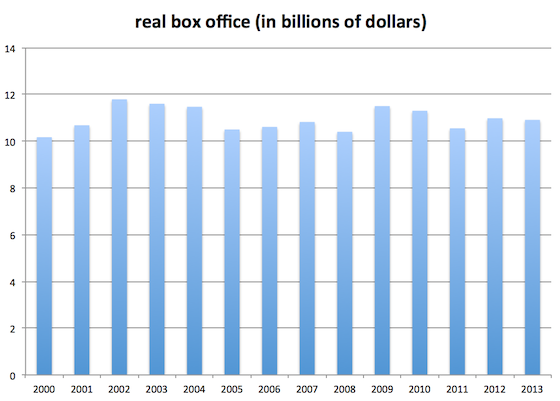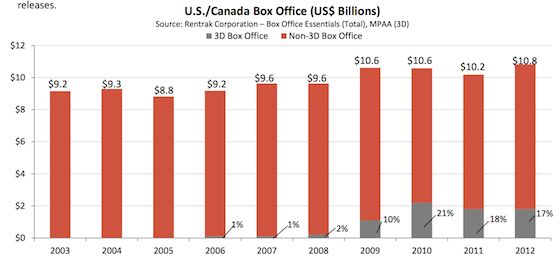The Wall Street Journal gushes about the box-office success of Disney’s Frozen, writing that the film has taken in $317.7 million and “surpassed “The Lion King” to become the highest grossing Disney-produced animated film of all time, not accounting for inflation or re-releases.”
Not accounting for re-releases makes perfect sense, but not accounting for inflation makes none at all. Taking about 15 seconds to visit the handy-dandy BLS inflation calculator tells us that The Lion King took in $492.1 million in today’s dollars back in 1994—55 percent more than Frozen.
Even if it was meaningless, at least the Journal‘s statement was explicitly factual. That wasn’t the case for most of the rest of the press.
Combine the Hollywood hype machine with standard journalistic innumeracy (and a little journalistic hype too), and you end up with the box-office “record”—a staple of the arts-and-entertainment sections.
Take this Associated Press story at year’s end, which said, “This year is poised to be a banner one at the box office, and it is projected to surpass 2012’s $10.8 billion by nearly 1 percent, making this the highest annual take ever.”
That’s just wrong in real terms, and it’s not even close. A 1 percent gain would put 2013 at $10.91 billion, which doesn’t even beat 2012’s $10.98 billion mark, which itself fell well short of 2010’s $11.3 billion. In fact, 2013 is only the sixth best year of the last dozen, in real dollars—some $900 million shy of 2002’s haul.
Here’s what the MPAA likes to put out there:
And here’s what that looks like adjusted for inflation:

They’re called real dollars for a reason. They’re real, not nominal, which means “in name only.” You’ll rarely see a correction or clarification for not adjusting for inflation, but these should be correctable errors.
And they’re all over the place.
A CNN headline blared, “2013 record breaking year at the box office.” Time said, “Hollywood Nears Record Year At The Box Office.”
The Guardian‘s headline calls it “2013’s record box-office hoard” and says “one must factor in inflation,” which it fails to do.
And then there’s the folks who really, really ought to know better. Places like Forbes, which said, “2013 Sets All-Time Box Office Record,” the Los Angeles Times, whose headline said, “Hollywood’s 2013 double feature: critical acclaim and box-office record,” and Variety, which said, “Write it down in the history books: 2013 was another record-setting year at the domestic box office.” Oh, and Bloomberg. None mentioned inflation.
Neither did The Motley Fool, TheStreet, the New York Post, TheWrap, and many more.
Worst of all, though, is USA Today, which somehow wrote this:
Despite some jaw-dropping summer flops and the lack of a monster smash the size of The Avengers, Hollywood will enjoy a record year at the box office.
And unlike many of the industry’s inflation-fueled sales records, this one is legit.
Say what?
USA Today doesn’t bother to back up its assertion, which is probably why it made it. One clue for the paper would have been its own paragraph that notes that Hollywood sold 200 million fewer tickets than it did in 2002—a 13 percent drop.
In any case, the paper is flat wrong.
Ryan Chittum is a former Wall Street Journal reporter, and deputy editor of The Audit, CJR’s business section. If you see notable business journalism, give him a heads-up at rc2538@columbia.edu. Follow him on Twitter at @ryanchittum.

